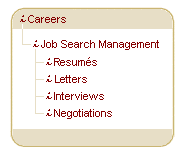You are introduced to a group of people who will interview you. What do you do?
Make a strong first impression by taking the time to establish eye contact, smile, and firmly shake hands with each person.
You are interviewed during a meal. What do you do?
Decline alcoholic beverages. Avoid expensive entres. Order a simple dish that you can eat without making a mess. Eat while the interviewer is talking; that way you will be ready to speak when it is your turn. Do not criticize the food, the restaurant, or the waiter.
You are asked a difficult question. What do you do?
Ask the interviewer to qualify the question, explain it in more detail. This gives you a better chance of coming up with a focused answer. It also gives you a little more time.
You realize the interviewer is going on and on with small talk, or with a political topic. What do you do?
Carefully steer the discussion back on track by asking a specific question about the job. Do NOT engage in discussions about any controversial social topic.
The interviewer says something you don't agree with. What do you do?
Don't argue. Acknowledge him with the statement, "I understand how you feel about that," and leave it alone!

 Careers
Careers



